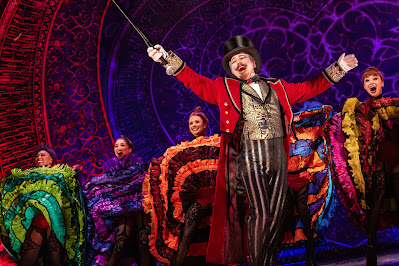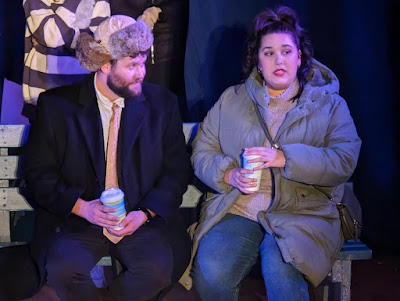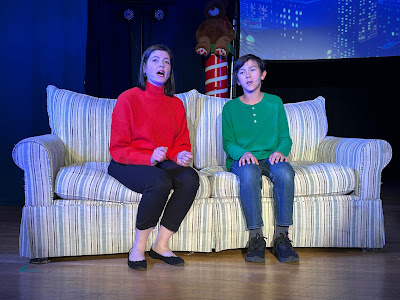By James V. Ruocco
"Say, aren't you Norma Desmond? You used to be big," chimes penniless Hollywood writer Joe Gillis.
"I am big," cries the desperate, still glamorous woman he comes face to face with in classic widescreen movie fashion. "It's the pictures that got small."
A great line.
A great moment.
A sneer. A swoop. A smile.
An edge of madness.
A dusty, secluded palazzo.
The fall of Hollywood.
An epic comeback.
Champagne and caviar.
A new beginning.
Or is it, the beginning of the end?
As Gillis points out, "You've come to the right party."
The address: 10086 Sunset Boulevard, Los Angeles, California.
And what a party, it is.
First produced in 1993 at London's Adelphi Theatre, "Sunset Boulevard," the musical, draws its inspiration from the 1950 Billy Wilder film of the same name that starred Gloria Swanson, William Holden, Nancy Olson and Erich von Stroheim.
A complicated, dark and revelatory satire about Hollywood and those who, have sadly, fallen from view, it looks back at the glamorous life of Norma Desmond, a long forgotten silent screen film star living in exile, but dreaming of a comeback pioneered by the great Cecil B. DeMille.
Drenched in gothic movie ambiance, resonant melodrama, cinematic parody and romantic reflection - all rolled into one - it quickly became "a hot ticket" for those theatergoers looking for something that was edgy, grand, passionate, eccentric and pride-mock-flamboyant. More importantly, it lovingly paid homage to Wilder's vision, his scathing look at the end of the silent movie era, its scars, its successes, its victims and its famous players.
In London, on Broadway, on National Tour or in Regional Theatre, when done right, "Sunset Boulevard" works magnificently.
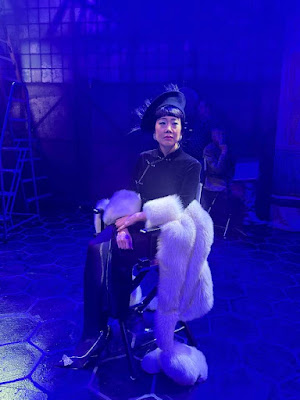
At ACT of CT, an immersive, acclaimed, award-winning Equity-based venue where dare-to-be-dared ideas, theories and conceits are seamlessly mixed with creative concepts, design elements and staging choices that are propulsive, harmonious and think-outside-the-box a freshness, the story and music of "Sunset Boulevard" is primed and ready for its closeup with comeback vehicle splendor, fiery anticipation, cleverly shaped persona and hit by a spotlight delusion and grandeur.
Delivered with intimate enhancement, creamy command, dead-eyed cynicism and high standard resolve, ACT of CT's deep dive glide into the anguish, beauty and torment of this classic Hollywood tale is truly magnificent. It is an attractive, powerful piece of musical theatre voiced with affirming mystery, playful abandon, rooted film noir, blunt attitude and grandiose narrative storytelling.
Executing all the right moves, marks, dashes and punctuations, it dazzles with spotlight persuasion, effort, and undeniably theatrical size, scope and exhilaration.
It is ambitious and full-hearted.
It is tight and old-fashioned.
It is snarky and acidic.
It is connective and edgy.
It is dark and dizzying.
It is Hollywood classic lost in a world of intertwined glamour, pathos and wonderment.

To give "Sunset Boulevard" the stand-out darkness and romanticism it needs to reach its quickfire high note, director Daniel C. Levine jumps right in and pens a unified, stunning film noir close up of reinvention, surprise, edge and Hollywood glamour with directorial choices so polished and attesting, the musical's clash between reality and fantasy explodes with first-time thrill-and-spill, twisty aspiration and exalted, hypnotized technique. As storyteller and artist, Levine is clearly in his element here and his collective grasp of the material, its tremendous sense of theatricality, its melodrama and its ripened colors and motifs befit his impassioned, ravishing storytelling.
Upon entering the venue's spacious, immersive playing space, the theatergoer finds the show's title colorfully emblazoned on a widescreen front curtain, which, through Levine's eyes, immediately prompts questions about the action that will soon unfold once the house lights dim, the overture is played, and the "Sunset Boulevard" story hits its mark.
Is this revival, arthouse cinema? Is it film noir homage? Is it 1950's theatre moved forward in time with real vintage Technicolor flair and flourish? Are, we, the audience, witness to downstage, voyeuristic intimacy steeped in silent movie expressionism and magic?
The answer, of course, is "Yes."
Well versed in the irony, bite and plot machinations of the original 1950 Billy Wilder screen version and the lush musicality of Webber's original stage adaptation, Levine, a visionary in his own right, puts his own directorial spin on this production, bringing new ideas and knowledge to the work using striking, simplified takes, pauses, beats and rhythms to create a cinematic, beguiling, one-on-one trajectory between actor and audience, conditioned with real thought, real drama, real purpose, inevitable edge and film noirish confrontation.

Directorially, Levine dances to his own decided beat and rightly so. Here, as in "Evita," "Jesus Christ Superstar" and Working," he is a true original. He's not interested in paint-by-numbers musical theatre. He's not one to play by the rules. He isn't going to let his audience down by page-by-page directorial copycatting or standard blueprint interpretation. Instead, he grabs his paintbrush and experiments. He takes chances. He rattles and roars. He interprets to cite strong reactions. He creates with buzz and devoted illustration.
What's remarkable about his take on "Sunset Boulevard" is the amount of attention Levine pays to detail. The movement of a prop, a kiss between Joe and Norma, a grimace, a widescreen shot or a hold is just as important to the storytelling as is the positioning of a silent film camera, a spotlight, a director's chair bearing the Paramount Studios logo, a walk through the studio backlot or the opening of a traveler curtain that reveals the Desmond palazzo featuring strategically placed black and white photos of the actress herself on the back wall, similar in style to those of silent screen movie star Anna Mae Wong, Hollywood's first Chinese-American star.
And that's only the beginning.
During the first act of "Sunset," Levine begins the pending seduction between silent screen star and penniless writer with a brilliant bit of staging that finds Desmond slowing unwrapping her "Salome" screenplay (she is hoping for "a return" to motion pictures) with a long red ribbon which she uses to entrap and ensnare Gillis by tying it up casually between his unsuspecting fingers. It's a hint of what will happen and one that Levine thrusts forward with an obvious sensuality and tension that heightens the brewing and eventual "toy boy" romance between the couple.
Given the musical's homage to the silent screen era, Levine, when necessary, adapts a clever, cinematic directorial style that is purposely played out with the exaggeration and melodramatic staginess of a D.W. Griffith 1915 movie epic. Most notable is Desmond's retreat to her glory days which has the character step forward into a flickering white light reenacting moments from one of her silent movies. It's an eerie, effective, mind-blowing process that immediately recalls Alla Nazimova's overacting in the 1921 film version of "Camille" and Lillian Gish's subsequent exaggeration in "The Birth of a Nation," circa 1915. A brilliant touch of madness, on Levine's part. Simply brilliant.
Elsewhere, Levine's melodramatic use of a gorgeous backwall stained glass window bearing a full-length image of Desmond herself is effectively played out with a special flashing-light madness (when needed, of course) that heightens the dramatic momentum of the piece as does a stop-and-go staging technique of red-and-white illusion that portrays the death of Gillis by Desmond's hand (i.e., revolver) during the final moments of the musical.

Set to music, "Sunset Boulevard" plays out its boldest prospects and achievements.
Its wavering, sometimes feverish themes of illusion, triumph, escape and film noir come full circle in the excitingly realized original musical score which bears the familiar Andrew Lloyd Webber creative stamp (he composed the music) and that of his collaborators Christopher Hampton and Don Black (they wrote the lyrics).
Filled with an engrossing mix of ballads, solos, duets, ensemble turns and cinematic anthems, the songs, all centered, positioned and primed, are, in order of performance: "Overture," "Let Me Take You Back Six Months," "Let's Have Lunch," "Every Movie's a Circus," "Surrender," "With One Look," "Salome," "The Greatest Star of All," "Every Movie's a Circus (reprise)," "Girl Meets Boy," "New Ways to Dream," "The Lady's Paying," "The Perfect Year," "This Time Next Year," "Entr'acte," "Sunset Boulevard," "There's Been a Call," "As If We Never Said Goodbye," "Surrender (reprise)," "Girl Meets Boy (reprise)," "Eternal Youth Is Worth a Little Suffering," "Too Much in Love to Care," "New Ways to Dream (reprise)" and "The Final Scene."
Webber's flair for the dramatic - via music, song style, progression and orchestration - works wonders here as he pays tribute to the original Billy Wilder 1950 motion picture, its theatrics, its subject matter, its irony, its darkness and its Oscar-winning score by Franz Waxman. It's pointed. It's set. It's determined. It's creative. It's sweeping. It's engaging. It's tango. It's jazz. It's showtune iconic. It speaks volumes.
More importantly, his compositions smartly reflect the buzz and snare of the movie industry, its backlot players, its forgotten stars, its entrapment, its cynicism, its power plays, its struggles, its delusions, its hypocrisy and its dream of, one day, making it big on the silver screen. Hampton and Black, in turn, strike back with choice, motivated lyrics that recall the acidity, the angst, the melancholy, the bite and the acknowledgement of the silent film era and the black-and-white movie.

With credits that include musical direction for the Broadway staging's of "Wicked," "Jagged Little Pill," "Chaplin," "Almost Famous" and the National Touring company of "Next to Normal," Bryan Perri is the perfect choice to bring "Sunset Boulevard" front and center at ACT of CT.
He's talented. He's centered. He's direct. He's inventive. He's focused. He's challenged. He makes beautiful music.
Here, as both musical director and conductor, he addresses the thrilling, monumental Webber/Black/Hampton score with wit, imagination and propulsion, thus, capturing the darkness, the romanticism, the melodrama and the moodiness of the piece, coupled with well-orchestrated bits of silent screen nostalgia, flickering eccentricity and quickfire snap, encouragement and attitude. It's a task he takes to heart with much-loved innovation, illumination, intensity, pride and evident enjoyment.
With Perri at the helm, the trio's musical language and its unique combination of words and music also comes full circle with effective, game-changing orchestral sophistication and brilliance. It's all savored and managed with luminous directness, interpretive specificity and Broadway musical rapture and enticement.
For this production, Perri (keyboard one) has assembled first-rate team of talented and dedicated musicians to bring the "Sunset Boulevard" score to life at ACT. They are Kai Hedin (viola), Jeff Cox (keyboard two), Seray Goktekin (violin), Cheryl Labrecque (cello), Gary Blu (reed one), Sue Goff (reed two), Darcy Macrae (drums/percussion), Ronald Hartner (trumpet/flugelhorn), Marjorie Callaghan (french horn), Kevin Callaghan (bass) and Dennis J. Arcano (synthesizer programmer). Vital, vigorous and attentive, this orchestral ensemble display a sterling sound and style that brings exhilarating highs to the musical score, its interpretive balance, its tonal challenges, its ripened qualities and its registrational grouping of musical numbers.
It's a distinct, ripe, collaborative effort, filled with the right touches and the right flourishes of sound, irony, string and functioning color. It is also flavorfully sprinkled with shimmering timbers, melodic waves, sumptuous movements and dashes of uplifting experimentation and ideas that complement the tone, the passion, the commitment and the evolution of the "Sunset Boulevard" story.
In terms of sound, power, expression, execution and orchestral instrumentation, this production far surpasses that of the original Broadway production and subsequent National Tour. Musically, it's Perri's show and one that portrays his great love of musical theatre, its melancholy flow, its construction, its dynamics and how as an art form, music is shaped, played and executed night after night to radiant, beguiling, roof-raising effect before a live audience.
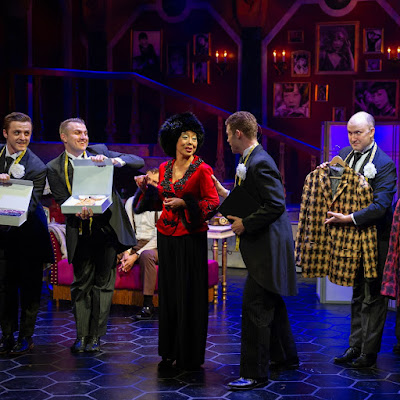
No musical would be complete without its share of production numbers and with "Sunset Boulevard" choreographer Sara Brians enlivens the two-act musical with movements, tableaus and aesthetic refinement that give a fresh feel to the proceedings, marked by instinctive dance strokes that are intoxicating and full of detail, color and narrative expressions. Like Levine, she portrays the production's vintage 1950's setting, stylization and mindset with the exactness of a period Broadway musical, an MGM Technicolor backlot production and a big widescreen weekend movie show layered with strong, on-stage chemistry, light and lyrical sweetness, pop culture precision and sweep and swoon volume and musicality. In turn, "Let's Have Lunch," "Every Movie's a Circus" and the show-stopping "The Lady's Paying" (the "Sunset" ensemble is absolutely incredible) glide across the stage with vivid, mindful signature purpose and absolutely no modernization (a Levine touch, as well) whatsoever. It's as though Brians time traveled back to the 1950's and returned with shot-for-shot theatricality, tilting reproduction and real, authentic cinematic confection.
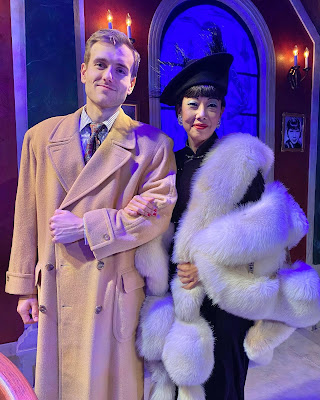
For the London production of "Sunset Boulevard," currently playing at the Savoy Theatre, director Jamie Lloyd chose to make the character of Norma Desmond (played magnificently by Nicole Scherzinger in the West End revival) younger than she was portrayed by Gloria Swanson in the 1950 film and the garish-looking, overwrought and spooky Glenn Glose in the original 1994 Broadway musical. It's a creative choice that is masterstroke worthy and one that Levine, for his ACT of CT directorial turn, also fulfills with equal opportunity and star status bravura with the casting of Asian-American star Pearl Sun as the delusional, tormented, glamourous Norma Desmond.
Sun is not only ready for her close up but delivers a powerhouse performance of glitter, intrigue and vulnerability like no other.
In the role of a faded movie star looking to reclaim her former glory as a box-office icon, Sun infuses the part of Norma Desmond with real glamour, madness, desperation and fantasy world entrapment.
She is silent screen goddess jilted by Hollywood industry abandonment. She is museum and mausoleum taunted. She is lush, romantic and melancholic. She is film noir greatness with dashes of Anna Mae Wong, Alla Nazimova, Pola Negri and Theda Bara. She is eccentric, abrasive and cunning. She is privileged and grand. In extreme close-up, her hands, her body and her eyes flicker with silent-screen magic.

Sun's brilliant assumption of the role, molded with confidence, rapture, encore and invitation, is ignited with affecting acumen, range, accuracy and vintage bravura. It's eye-catching revolutionary - defying gravity, if you prefer - but at the same time, very much, original, committed, stand-alone focused, vital and bewitching.
Vocally, she tears into the Webber/Black/Hampton score with raw, reflective escape, powerful lift, elbowing and tone, gracious imagination and leading lady warmth, radiance and sensation. Singing such iconic showstoppers as "With One Look," "As If We Never Said Goodbye," "Surrender" and "The Perfect Year," Sun is very much in her element, channeling the inspiration, drama, variety and note-perfect brilliance of the "Sunset Boulevard" musical score to perfection. But she's no copycat. She's an original.
When she steps downstage center to perform the second half of the silent movie drenched remembrance "As If We Never Said Goodbye" with stand-out capture, the actual number, as staged by Levine, not only magically seduces the theatergoer, but the on-stage ensemble as well, all of whom slowing turn, bask and succumb to the beauty of Sun's solo, its intertwined fantasy, its triumphant grandeur and its lyrical brilliance.

Michael Burrell, cast in the role of Joe Gillis, the drifting opportunist and fledging Hollywood writer who allows himself to be kept by Norma Desmond, invests the part with the dash, charm, curiosity, good looks and tangled entrapment envisioned by the musical's original collaborators. It's a performance of boulevard acknowledgement and Hollywood dazzle and dream mixed with proper confidence, irony, swagger and homage-spirited influence.
His many vocals - "Let Me Take You Back Six Weeks," "Sunset Boulevard," "Too Much in Love to Care," "Let's Have Lunch," "Girl Meets Boy"- are delivered not only with the crisp, powerful truism and flair reflective of his strong, natural hold on the musical elements of the piece, but with the wit, sarcasm and expression concurrent in the sweeping score, its suave, tart lyrics and the vitality of the proceedings.As sweet-voiced, anxious Betty Schaefer, Helen J. Shen inhabits the role (she plays Gillis' attractive, aspiring writing partner) with a certain charm, zest, personality and clarity that not only defines her important position in the musical narrative but gives it a strongness and confidence that is put to great use whenever she's on stage, most notably in her many scenes with Michael Burrell, her charismatic co-star. Vocally, she possesses an amazing voice, style and range that is wonderfully refreshing, engaging and chock full of emotional certainty. Listening to her perform the beguiling, showstopping duet "Too Much in Love to Care" alongside Burrell halfway through Act II furthers that notion. Both performers build this song to such stirring, romantic effect, a replay would be most welcomed.

George Xavier, as Max Von Mayerling, Norma Desmond's former director and ex-husband, now dutifully positioned as the silent screen film star's trusty manservant and fierce protector, crafts a masterful, haunting portrait of a silent screen auteur and survivor, mixed with the darkness and delusion of the character as portrayed in both the Billy Wilder movie and the original Broadway production. He is both captivating, majestic and achingly sincere. Vocally, his rich bass-baritone range is seasoned ready, intersected with wonderful clarity of pitch, tone and dynamic control, most notable when he performs Mayering's hypnotic solo "The Greatest Star of All" in Act II and the emotionally riveting reprise of "New Ways to Dream" in Act II.
As evidenced in previous ACT of CT productions - "Evita," "Working," "Nickel Mines," "Little Shop of Horrors," "Jesus Christ Superstar," among others, - the design element is an important point of every presentation. Here, the creative team of David Goldstein (scenic designer), Charlie Morrison (lighting designer), Kurt Alger (costume and wig designer), Marisa J. Barnes (sound designer), Angelina Avallone (makeup designer) and Daniel C. Levine (projection designer) work together, using talents, ideas, experimentation and backstage savvy to create a "Sunset Boulevard" stomping ground rich in color, atmosphere, nostalgia and character. It's a focused camaraderie with tech and visuals rooted firmly in the past world of yesterday that bring the theatergoer closer to the world of both Billy Wilder and Andrew Lloyd Webber.
Ensemble wise, "Sunset Boulevard" overflows with a dream cast of actors, singers and dancers, some of whom have graced the ACT of CT stage before or are making their official ACT debut with this production. All of them - Emily Solo, Amanda Hunter-Finch, Gary Harger, Val Moranto, Liz Schmitz, Andrew Winans, Will Stone, Mac Myles, Conor McGiffin, Daniel Pahl, Claire Fossey, Pragun Bhardwaj, William Bishop, Jasmine Gobourne - are well-suited for each of the particular roles they are asked to portray throughout the two-act musical, each akin to Levine and Brian's 1950's mindset, the musical's vintage pairings, groupings, staging and stylization, its choreography, its songs, its harmonies, its film noir homage, its Hollywood grandeur, its plotting, its evolution and its emotional denouement.

A mind-blowing triumph for director Daniel Levine, his cast and his creative team, this hypnotic portrayal of "Sunset Boulevard" sets the ACT of CT stage ablaze with groundbreaking intensity and glory, backed by a thrilling springboard of vamp, memory, illusion, embrace and caring, total artistic achievement.
Recharged with an honest, affecting intimacy and an intimate 1950's film classic dramatic stylization that leaves a long, lasting impression, it bristles with such dare and avant-garde sensation, it demands to be seen not once, but twice, without question.
Its fearless gaze into the forgotten Hollywood of yesteryear is both haunting and swaying as is its properly balanced turntable of story, music, song, action and character.
As seen through the directorial lens of Levine and musical showman Bryan Perri, it tilts, its spins, it haunts, it teases, it marvels, and it surprises.
This is musical theatre at its best, primed and etched to perfection, basking in the chilling, truth-bending sweep set forth by its London-based originators, its leading ladies, its glossy storytelling devices and its whip smart, film noir magnificence.
In Norma Desmond's eyes, "it's the pictures that got small."
And, maybe, that is true.
But here, at ACT of CT, "Sunset Boulevard" is alive with endless possibility, delivery, captivation and unmistakable shatter, force, doom and gloom. It's also more than just one woman's descent into extreme close-up madness as the music builds to a crescendo, the character of Norma Desmond faces her tormented fate the stage lights fade to black.
This is go-for-broke "Sunset Boulevard" with a numbing, gratifying big finish.

Photos of "Sunset Boulevard" courtesy of Jeff Butchen.
"Sunset Boulevard" is being staged at ACT of CT (39 Old Quarry Road, Ridgefield, CT), now through November 19, 2023.
For tickets or more information, call (475) 215-5497
website: actofct.org





